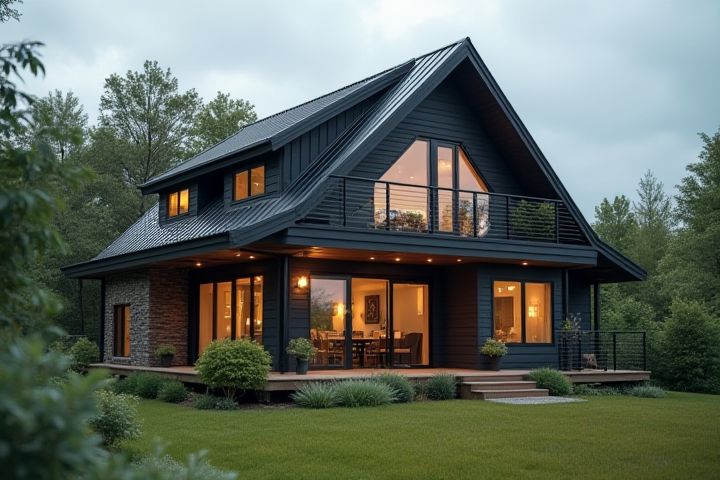
A house can indeed be off the grid by utilizing renewable energy sources such as solar panels or wind turbines, which generate electricity independent of the public utility grid. To achieve full off-grid status, it is essential to implement energy storage systems like batteries, allowing you to store excess energy for use during low production periods. Water supply can be sourced from rainwater harvesting systems or wells, while wastewater management solutions include composting toilets and greywater recycling systems. Sustainable building practices, such as using natural insulation and energy-efficient appliances, can further reduce your reliance on external utilities. With careful planning, a comfortable and self-sufficient lifestyle is achievable in an off-grid home.
Can A House Be Off The Grid
Solar panels
A house can be off the grid by utilizing solar panels as a primary energy source, allowing independence from traditional utility companies. Solar panels convert sunlight into electricity, which can power your home's appliances, heating, and cooling systems. To achieve complete energy self-sufficiency, it is essential to incorporate a battery storage system to store excess energy generated during sunny days for use during cloudy periods or at night. Additionally, pairing solar panels with energy-efficient appliances and practices can further enhance your home's sustainability and reduce overall energy consumption.
Wind turbines
A house can effectively be off the grid by utilizing wind turbines for energy generation. Wind turbines convert kinetic energy from wind into electrical power, enabling homeowners to produce renewable energy and reduce reliance on conventional power sources. By installing an appropriate-sized wind turbine system, you can generate sufficient electricity to meet your household's needs, particularly in areas with consistent wind flow. Incorporating energy storage solutions, like batteries, ensures that you have a reliable power supply even during calm wind conditions, further enhancing your self-sufficiency.
Battery storage
A house can indeed be off the grid by utilizing battery storage systems to harness renewable energy sources such as solar or wind power. These energy storage batteries, often lithium-ion or lead-acid, enable homeowners to store excess energy generated during peak production times for use during periods of low generation or high consumption. By effectively managing energy usage and integrating energy-efficient appliances, you can maintain a fully functional home that operates independently from utility services. This self-sufficient approach not only reduces your carbon footprint but also offers significant savings on energy bills over time.
Rainwater collection
Yes, a house can be off the grid by utilizing a rainwater collection system. This innovative solution captures and stores rainwater for various uses, including drinking, irrigation, and sanitation. A properly designed rainwater harvesting system can include gutters, downspouts, a storage tank, and filtration systems to ensure water quality. By implementing this sustainable practice, you can significantly reduce your dependency on municipal water supplies while promoting environmental conservation.
Septic systems
A house can indeed be off the grid by utilizing a septic system for wastewater management. A septic system consists of a tank and drain field designed to treat and dispose of household wastewater without reliance on municipal sewer systems. Properly functioning septic systems are essential for maintaining environmental hygiene, as they filter out impurities through natural processes. When planning an off-grid home, ensure that your septic system complies with local regulations to prevent potential health hazards and protect groundwater resources.
Composting toilets
A house can be entirely off the grid by utilizing composting toilets, which are self-contained systems that convert human waste into compost through aerobic decomposition. These eco-friendly toilets eliminate the need for traditional sewage systems, making them ideal for remote living or eco-conscious homeowners. Composting toilets require minimal water, supporting water conservation efforts, and can be equipped with systems to enhance ventilation and optimize the composting process. By incorporating a composting toilet, you contribute to sustainable living while reducing your environmental footprint and promoting soil health.
Off-grid appliances
Off-grid appliances are essential for making a house self-sufficient and environmentally friendly. Solar-powered refrigerators can consume as little as 50-100 watts, significantly reducing energy dependence. Likewise, energy-efficient cooking devices, such as induction stoves or slow cookers, utilize less electricity, allowing them to operate effectively on solar or battery power. By incorporating composting toilets and gray-water systems, you can enhance the sustainability of your off-grid home while minimizing water and waste usage.
Energy efficiency
A house can indeed operate off the grid by utilizing energy-efficient technologies and renewable resources. Installing solar panels or wind turbines generates sustainable electricity, while energy-efficient appliances reduce overall consumption. Incorporating proper insulation and energy-efficient windows minimizes heat loss, enhancing comfort without excessive energy use. For optimal results, you should consider a combination of these strategies, allowing your off-grid home to remain self-sufficient and environmentally friendly.
Sustainable building materials
A house can indeed be off the grid by utilizing sustainable building materials such as bamboo, reclaimed wood, and straw bale. These materials not only reduce environmental impact but also provide excellent insulation, minimizing energy consumption. Integrating solar panels and rainwater collection systems further enhances a home's energy independence while utilizing natural resources efficiently. With advancements in eco-friendly technologies, your off-grid home can achieve self-sufficiency while promoting a healthier planet.
Zoning regulations
A house can indeed be off the grid, but it must comply with local zoning regulations, which can vary significantly by location. These regulations often dictate land use, minimum lot sizes, and building codes, impacting your ability to install renewable energy systems or water collection systems. For example, some areas require permits for solar panels or rainwater harvesting, while others may have restrictions on the type of sewage disposal systems allowed. To successfully establish an off-grid home, thoroughly research your specific zoning laws and engage with local planning offices to ensure compliance.
